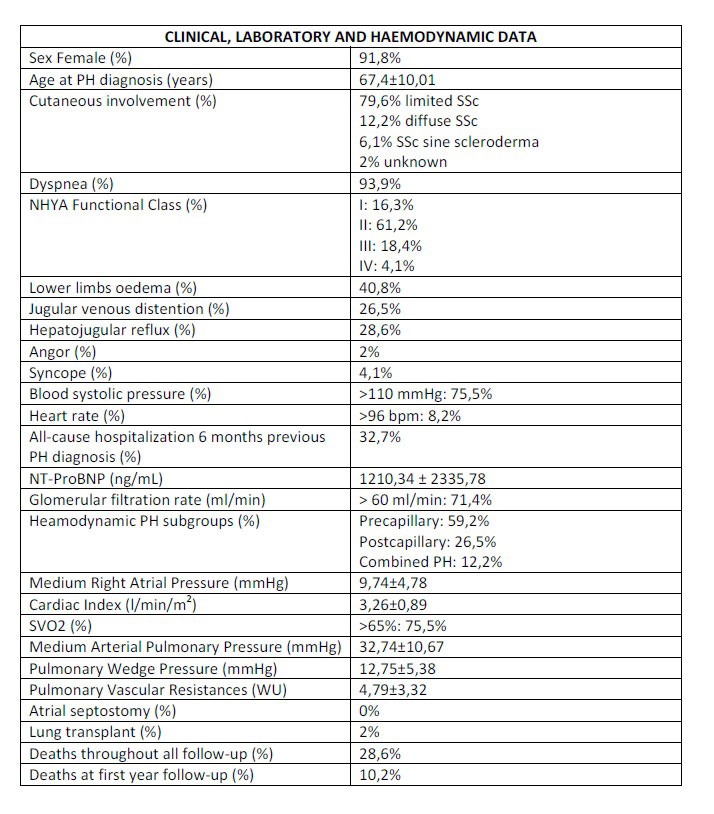Session Information
Session Type: Poster Session B
Session Time: 9:00AM-10:30AM
Background/Purpose: Pulmonary arterial hypertension (PAH) leads to a progressive right heart failure and death.PAH is a leading cause of death in Systemic Sclerosis (SSc). To stratify the prognosis and 1-year survival of patients with PAH REVEAL 2.0 score was developed. It classifies each patient in low, moderate and high-risk of death at the first year of follow-up. It demonstrated greater risk discrimination compared to other risk assessment strategies based on European Society of Cardiology/European Respiratory Society strategy (ESC/ERS). REVEAL 2.0 has been validated in SSc-PAH. However, SSc can develop other etiology of pulmonary hypertension (PH) than PAH. To know the correct classification of PH in SSc is crucial to treat correctly the patients.
Up to now, there are no studies that apply REVEAL 2.0 to pulmonary hypertension different than SSc-PAH.
Our objective is to apply REVEAL 2.0 in SSc cohort with all-cause PH and to analyze its usefulness to predict one-year mortality in SSc patients.
Methods: Retrospective multicenter study made in SSc-PH patient cohort of 3 expert centers in SSc management. All SSc-PAH were diagnosed by right heart catheterization. Clinical, laboratory, haemodynamic and ecographic data were recorded. REVEAL 2.0 score was applied at the disease diagnosis. The comparison between REVEAL 2.0 score and ESC/ERS score was determined. Indeed the relationship between REVEAL 2.0 and 1-year mortality, death during follow-up were also analyzed.
Results: Data from 49 patients with SSc-PH was analyzed. Tables 1 and 2 summarize the features of the sample.
During the follow-up REVEAL 2.0 showed that patients at intermediate risk at diagnosis had a HR of 6.76 (CI95% 0.7 – 62.3, p=0.09) of mortality in comparison with low risk patients. Patients at high risk at diagnosis had a HR of 8.84 (CI95% 1.1 – 70, p=0.039) compared to low risk patients during follow-up. The global model is statistically significant (p=0.025)
Regarding the first year of follow-up, REVEAL 2.0 showed that patients at intermediate risk at diagnosis had a HR of 10.10 (CI95% 1.1 – 90.4, p= 0.039) of death vs patients at low risk. Patients classified as high risk had an HR of 11.32 (CI95% 1.4 – 89.3, p=0.021) compared to patients at low risk.
Regarding to ESC/ERS score during whole follow-up, patients at intermediate risk at diagnosis had a HR of 10.25 (CI95% 1 – 82, p = 0.048) compared to low-risk patients, while patients at high risk had a HR of 10.02 (CI95% 1.3 – 81.1, p= 0.027). At 1-year follow up in patients at intermediate risk at diagnosis, we did not observe differences compared to low-risk patients, HR 3.02 (CI95% 0.9 – 19, p = 0.077), but higher risk of death was observed with high risk patients compared to low-risk, HR 8.08 (CI95% 1.7 – 59.9, p = 0.01)
When comparing REVEAL 2.0 and ESC/ERS at diagnosis of PH-SSc, we observed a correlation for low and high risk cathegories, but not for intermediate risk. This could be explained by the small size of the sample.
Conclusion: The REVEAL 2.0 seems to be a good tool to categorize the death risk for all-cause SSc-PH at first year of onset PH diagnosis. It correlates with ESC/ERS for low and high risk, but not for intermediate risk. REVEAL 2.0 seems to have more capacity for predicting mortality at 1 year and during the follow-up compared to ESC/ERS.
To cite this abstract in AMA style:
Casafont-Solé I, Calvo L, Riveros-Frutos A, De la Puente Bujidos C, Alcubilla P, Mateo L, Castellví I. Usefulness of REVEAL 2.0 Score as a Prognosis Tool of All-Cause Pulmonary Hypertension in Systemic Sclerosis Patients: A Multicentric Study [abstract]. Arthritis Rheumatol. 2022; 74 (suppl 9). https://acrabstracts.org/abstract/usefulness-of-reveal-2-0-score-as-a-prognosis-tool-of-all-cause-pulmonary-hypertension-in-systemic-sclerosis-patients-a-multicentric-study/. Accessed .« Back to ACR Convergence 2022
ACR Meeting Abstracts - https://acrabstracts.org/abstract/usefulness-of-reveal-2-0-score-as-a-prognosis-tool-of-all-cause-pulmonary-hypertension-in-systemic-sclerosis-patients-a-multicentric-study/


